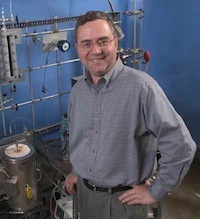Wisconsin engineer honored for ongoing innovation
Corn may be a dietary staple for humans and animals around the world, but in Jim Dumesic‘s eyes, the plant “waste” left after the harvest holds even more potential as a renewable bio-based source of fuels and important chemicals.

Jim Dumesic
On Dec. 10, the National Academy of Inventors (NAI) named Dumesic, the Steenbock professor and Michel Boudart professor of chemical and biological engineering at UW–Madison, among 143 leading innovators elected to its 2013 class of fellows. The honor recognizes Dumesic for significant advances that have made an impact on the economy and on human welfare.
A member of the National Academy of Engineering and the American Academy of Arts and Sciences, Dumesic is among the most decorated scientists in the fields of catalysis and chemical engineering. Throughout his 35-year career, he has logged major contributions to the science and process of converting cellulosic biomass into products that benefit society.
In 2003, he and colleagues founded Virent Energy Systems to commercialize their environmentally friendly method for turning plant waste into biofuel. Today, the company’s suite of bio-derived products includes gasoline, diesel, jet fuel and chemicals used in the plastics and fiber industries.
Now, Glucan Biorenewables, the company Dumesic founded with colleagues at Iowa State University, is producing non-petroleum-based commodity chemicals using sustainable processes they developed for converting plant sugars into furan derivatives.
Virent Energy Systems’ suite of bio-derived products includes gasoline, diesel, jet fuel and chemicals used in the plastics and fiber industries.
In recent years, Dumesic and his research group have studied ways to convert lignocellulosic biomass to gamma-valerolactone, or GVL, for use in chemicals or as an intermediate in fuel production. They currently are building a system in their laboratory that ultimately could help them scale their new biomass conversion technologies up to commercial levels. “This work has the potential to open new opportunities for the economically viable conversion of renewable biomass resources to liquid fuels, as well as chemical intermediates for a bio-based economy,” he says.
NAI is a nonprofit organization comprised of U.S. and international universities and nonprofit research institutes. Founded in 2010, it recognizes and encourages academic invention and seeks to encourage technology development for the benefit of society.
The 2013 class of NAI fellows includes 26 presidents and senior leadership of research universities and nonprofit research institutes, 69 members of the National Academies, five inductees of the National Inventors Hall of Fame, six recipients of the U.S. National Medal of Technology and Innovation, two recipients of the U.S. National Medal of Science and nine Nobel laureates, among other major awards and distinctions.
Andy Faile, the U.S. Patent and Trademark Office deputy U.S. commissioner for patents, will induct the 2013 fellows during a March 7, 2014, ceremony at the patent office headquarters.
